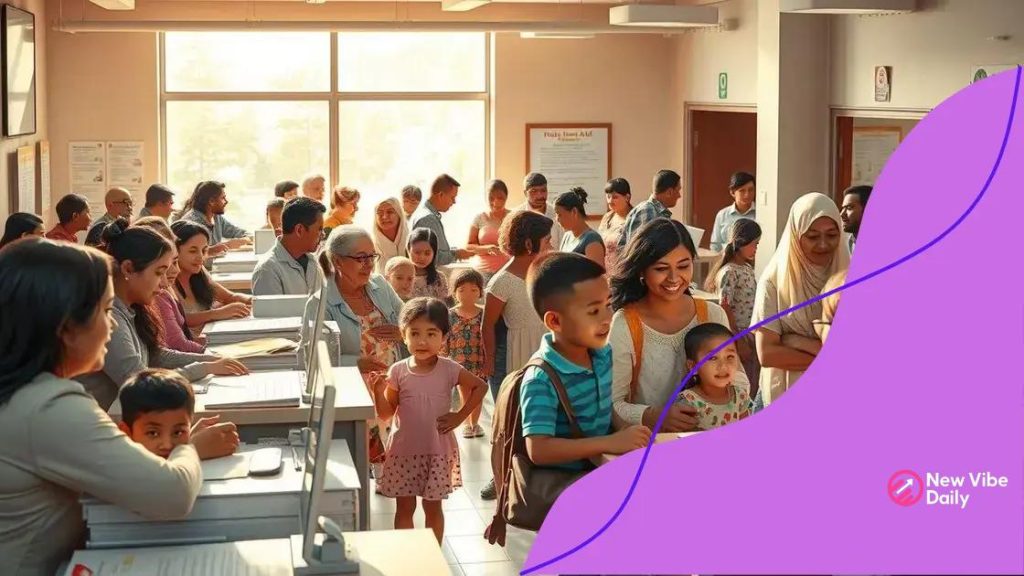Emergency cost of living schemes: find support today

Emergency cost of living schemes provide essential financial assistance for individuals and families facing unexpected hardships, helping to cover expenses like rent, utilities, and groceries in times of need.
Emergency cost of living schemes are designed to offer support during financially tough times. Have you ever wondered how these programs can help you or someone you know? Let’s explore what options are available.
Understanding emergency cost of living schemes
Understanding emergency cost of living schemes is essential for many people facing financial difficulties. These schemes are designed to provide timely support during tough economic times, helping individuals and families stay afloat.
What Are Emergency Cost of Living Schemes?
These programs offer financial assistance to people who suddenly find themselves in a precarious financial situation. They can help cover essential expenses such as food, housing, and utilities.
Key Features of the Schemes
- Rapid application processes
- Targeted assistance for vulnerable populations
- Temporary support that meets immediate needs
As you navigate through your options, it’s important to remember that each scheme may have distinct eligibility criteria. For many, understanding these criteria can mean the difference between receiving help and going without.
Who Qualifies for Financial Aids?
Various factors determine eligibility, but generally, individuals facing unemployment, sudden medical expenses, or other unforeseen financial hardships may qualify. However, local government policies may vary, so always check specific requirements in your area.
Applying for these schemes involves straightforward processes. Many applications can be completed online or over the phone, which makes it accessible for those in urgent need.
Additional Support Options
- Food banks and community resources
- Nonprofit organizations offering free financial advice
- Government websites with updated resources
It’s also important to explore all available resources. Beyond emergency cost of living schemes, consider other community-based programs that may assist you. Connecting with local support services can provide valuable information tailored to your specific needs.
In summary, understanding these schemes is crucial for those in need. They serve as a lifeline during challenging times, allowing individuals to gain stability and regain control of their lives. By knowing what options and resources are available, you can better navigate your financial situation.
Who qualifies for these financial aids?
Who qualifies for these financial aids? Understanding the eligibility criteria is crucial for accessing support during challenging times. Various factors can determine who gets assistance.
Generally, individuals facing unexpected financial hardship may find relief through these programs. Many people who lose their jobs due to layoffs or medical emergencies can apply.
Common Eligibility Criteria
- Being unemployed or underemployed
- Experiencing sudden medical expenses
- Being a single parent or caretaker
Some programs focus on helping specific groups. For instance, families with children, seniors, and individuals with disabilities often have dedicated resources. Additionally, income limits may apply, meaning your current financial situation is assessed when you apply.
Assessing Your Situation
If you think you might qualify, gather relevant documents. This includes proof of income and identification. Having these on hand aids the application process.
Don’t hesitate to reach out for guidance. Local organizations often provide assistance in understanding eligibility. They can help clarify any questions you may have.
The goal of these financial aids is to provide a safety net. Many programs aim to cover essential expenses, so knowing if you qualify can make a significant difference.
Key benefits of applying for support

Applying for support through emergency cost of living schemes can provide numerous advantages. Understanding these benefits can help motivate individuals to seek assistance when needed.
Immediate Financial Relief
The most significant benefit is immediate financial relief. These programs can help cover essential expenses like rent, groceries, and utilities. For many, this support can prevent falling into deeper debt.
Access to Additional Resources
- Information about related programs
- Connections to local services
- Guidance on budgeting and financial planning
When applying for support, applicants often gain access to other community resources that can further aid their situation. For example, local organizations may offer food assistance or job placement services.
Stability During Uncertain Times
Financial instability can cause significant stress. Applying for assistance can provide a sense of security. Knowing that help is available allows individuals and families to focus on long-term solutions rather than immediate survival.
Additionally, these programs can enhance mental health. When financial burdens are lessened, families can engage more positively with one another and improve overall well-being.
Empowerment Through Information
Seeking support also empowers individuals to learn more about their financial situations. Many programs provide education on budgeting, saving, and managing expenses. This knowledge is valuable in making better financial choices in the future.
By understanding the key benefits of applying for support, individuals can feel more confident in taking the first step toward financial stability. Accessing aid can be a pivotal moment in reclaiming control over one’s life.
How to navigate application processes
Knowing how to navigate the application processes for emergency cost of living schemes can make a significant difference. Understanding the steps involved can help streamline your experience.
Gather Required Documents
Begin by collecting all necessary documentation. This typically includes proof of identification, income statements, and details of your current financial situation. Having these ready can speed up the process.
Understanding Application Methods
Applications can often be completed online, over the phone, or in person, depending on the program. Online applications are convenient, but some people may prefer face-to-face assistance. It’s important to choose the method that best fits your needs.
- Online applications often have user-friendly portals.
- Phone applications usually require one-on-one conversations to clarify details.
- In-person visits allow for direct assistance and questions.
Once you decide how to apply, prepare your answers carefully. Each application may require different information, and being thorough can prevent delays.
Follow Up on Your Application
After submitting your application, don’t hesitate to follow up. Most programs provide a way to check the status of your application. If you don’t hear back within the specified time, contacting the program can ensure your application is being processed.
Moreover, understanding the timeline for review helps set realistic expectations. Many programs will inform you about how long each stage typically takes.
Connecting with local support services can provide vital insights and tips for your application process. These organizations often have experience and can guide you through potential challenges.
Real-life examples of successful assistance
Real-life examples of successful assistance highlight the effectiveness of emergency cost of living schemes. These stories show how individuals and families can regain stability through available resources.
Case Study: The Johnson Family
After Mr. Johnson lost his job unexpectedly, his family faced financial hardships. They were concerned about making rent and keeping the lights on. By applying for an emergency cost of living scheme, they received assistance that covered their essential expenses for three months. This support not only eased their immediate worries but also allowed Mr. Johnson time to find a new job without the pressure of financial strain.
Case Study: Single Parent Success
A single mother, Mary, was struggling to make ends meet after her hours were reduced at work. With two children to support, every penny counted. She reached out for help and learned about available financial aid. Thanks to quick approval for benefits, she could buy groceries and pay her utility bills. Mary shared how this support made a massive difference in their daily lives, providing both practical assistance and peace of mind.
Community Impact
These examples are not isolated incidents. Communities across the nation are seeing similar outcomes. Many families have accessed assistance programs that allow them to navigate tough times while maintaining a sense of dignity. Stories like these encourage others to seek support when needed.
- Over 60% of applicants reported feeling relieved after receiving assistance.
- Many families improved their financial literacy through program resources.
- Assistance helped individuals return to the workforce sooner.
Real-life success stories demonstrate the value of seeking help. They serve as reminders that solutions are available to those in need, helping turn financial struggles into pathways for recovery and stability.
In conclusion, understanding and utilizing emergency cost of living schemes can provide essential support during times of financial hardship. By applying for these programs, individuals and families can gain access to immediate assistance and resources. The stories of success illustrate the positive impact that these aids have on people’s lives. Remember, help is available, and you are not alone in your struggles. Seeking support can lead to renewed stability and hope for a better future.
FAQ – Frequently Asked Questions about Emergency Cost of Living Schemes
What types of assistance are available through these schemes?
These schemes provide financial help for essential needs like housing, food, and utilities during times of financial hardship.
How do I apply for emergency cost of living assistance?
You can apply online, by phone, or in person depending on your local program. It’s important to gather all necessary documentation before applying.
Who is eligible for financial assistance?
Eligibility typically includes those facing unexpected financial hardships, such as job loss, medical emergencies, or reduced income, among other criteria.
What should I do if my application is denied?
If your application is denied, review the reasons provided, gather any additional documentation needed, and consider reapplying or seeking assistance from local organizations.






